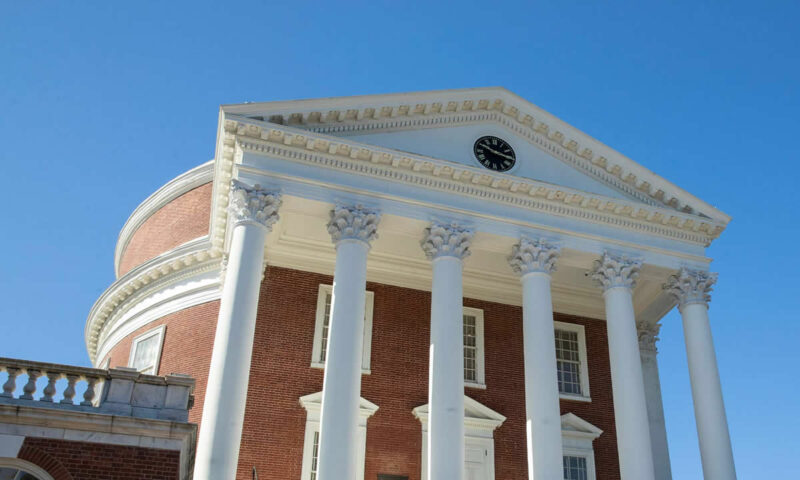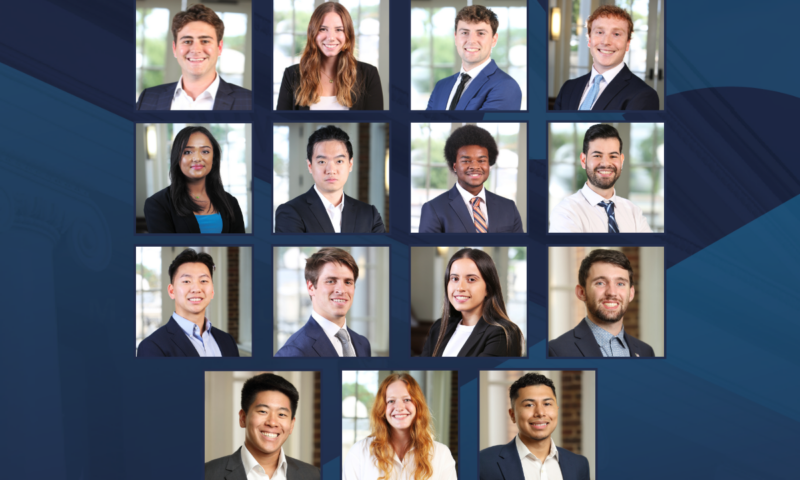
Justice Dixon
As we close in on the start of a new semester, I’ve found myself reflecting on the past several months and my experience in the M.S. in Commerce Program. I think back to the fond moments meeting and working with classmates, but also dwell on the challenges that have come with learning during the pandemic.
Even though I enjoyed the in-person hybrid experience this past semester, I recognize that this was not the typical UVA student experience. With this being my first year in Charlottesville, I have no firsthand experience as to how this year differs from others. To better understand these differences, I spoke with a few of my classmates in the program who attended the University as undergraduates, which gave me insight into how the hybrid system meshes with the typical UVA experience.
Hear from three UVA graduates about their transition from undergraduate studies to grad school and how the academic and social experience differed from their last four years.
Jordan Beeker (French and Anthropology ’20)
Business Analytics Track, GCOM Council President
Lindsey Page (Political and Social Thought ’20)
Marketing & Management Track
Alan Pouliquen (Media Studies and French Language & Literature ’20)
Business Analytics Track
Matthew Van Slyke (Economics ’20)
Business Analytics Track
What has been the most challenging part of hybrid learning, and how do you think the program has tackled this challenge?
Alan: The most challenging part of hybrid learning for me has been building relationships with my peers outside of class. I really believe the M.S. in Commerce Program has taken many steps to foster community building despite this challenge, though. For example, I was glad to see that Commerce Council was able to organize virtual trivia nights and bagel socials under appropriate social distancing guidelines. This allowed the class to come together and engage outside of the rigors of the academic program.
Matthew: I think one of the challenges at the start of the program was mastering the different technologies and applications being used for assignments and lectures. As the semester progressed, however, professors gathered feedback between the various courses and streamlined many of these channels in order to standardize procedures and limit the number of applications used. Organization and communication helped to overcome any technological difficulties.
Lindsey: I generally enjoy speaking in class, but I am very intimidated by the idea of speaking on Zoom. Almost all of our professors created discussion boards online so that people could share their thoughts, though, without having to speak over the video chat, which I found helpful.
Can you tell me about two of your favorite memories so far, one virtual and the other in-person?
Jordan: Near the beginning of the semester, our Business Communications Professor, Rob Patterson, had a class activity in which randomly selected students had to give an impromptu sales pitch about a random everyday object pulled out of a bag. It ended up being a very funny and candid activity that reminded me of what an in-person environment would have been like.
Another great part of the program so far has been the other students I have met. Before I entered the program, I always knew of the program as having a very tight-knit community. I mean it when I say everyone is here to support each other, even during this pandemic. That being said, the best memories of this program have been spending time with the friends I have made here. We have shared countless memories exploring Charlottesville, bonding over the successes and challenges of virtual learning, and supporting each other along the way. These experiences have reminded me that these strong bonds are still possible even with COVID restrictions.
Lindsey: One of my favorite memories from last semester was meeting my assigned group. It was clear from the start that we were going to work well together, and it was the first time I had met anyone from the program in person. My favorite virtual memory is probably from one of our early Finance classes. Everyone started bringing their dogs and cats up to the camera to say “Hi” to the class. It’s always nice to have a little break during class like that.
Matthew: Professor Ira Harris teaches virtually from his office, so we are now very familiar with seeing his face with his office in the background. Someone took a picture of this background and sent it to everyone in the program and on the last day of class, we all set our Zoom backgrounds to look like we were sitting in Professor Harris’ office. He was definitely surprised and couldn’t stop laughing.
Another fun memory was when Commerce Council separated our class into small groups and asked us to get dinner together so that we could meet each other in person, without breaking the school mandate against large gatherings. We sat outside around a fire pit, grilled burgers, and had a socially distant dinner.
What has been your favorite class and why?
Matthew: My favorite class from last semester was Professor Adam Koch’s Financial Accounting course. Personally, I am not a huge fan of accounting itself, but he is a phenomenal teacher. He kept lectures simple and to the point and always had concrete examples. I think that the core of a well-taught class will always carry through to students regardless of the medium, whether it is in person or online. I guess I’d say that he tackled the hybrid challenge by taking each day as it came and always having IT on speed dial in case the classroom microphones acted up.
Lindsey: My favorite class was Professor Andrea Roberts’ Cost Accounting class. There were a lot of students in her class, so it was difficult for her to see all the students who were raising their hands on Zoom. She would post a list of students who were “on call” at the beginning of every class, and these students were responsible for being the first to answer her questions. This allowed for a steady flow of conversation, even though we weren’t in the classroom.
Alan: My favorite class so far was Intro to Business Analytics because it is a completely new and interesting discipline to me. Professor Brent Kitchens has done an excellent job tackling the hybrid challenge through his passion for helping us and getting us to understand the course concepts. I don’t think there was ever a time that a question I sent to him on Microsoft Teams went unanswered, and I could tell he truly cared about ensuring we had the best possible learning experience despite the challenges.
As UVA alum, how has your experience this year differed from the past four years? How has it been similar?
Lindsey: During undergrad, there were certain spots where students were known to gather. For example, the second floor of Clemons Library is known to students as the “social” floor. A lot of these spaces were closed due to COVID; however, McIntire opened the Commerce facilities to McIntire students with stipulations for social distancing. The McIntire courtyard ended up serving a similar purpose as certain “social” areas did previously, given that outdoor spaces were a much safer place to meet up. You could always find students chatting and working on assignments together in the courtyard during the day.
Alan: The obvious difference is the challenge imposed by the pandemic, but I think in a lot of ways my experience at UVA, with the friendliness of the people, has remained the same. It is very easy to build a strong community at UVA, and people are always looking out for each other, even more so now than ever before.
Jordan: Commerce has been a whole new world for me coming in as a French and Anthropology undergrad. The largest difference for me has been the amount of group work in this program. For most liberal arts majors, learning and schoolwork can often feel independent and autonomous. In this program, I have had to learn about the compromises and strengths involved with group work, which I believe will parallel professional life after this program. Apart from that, I have found that Commerce involves the rendering of more technical and quantitative skills in a way I have not used before. Courses such as Financial Accounting and Finance have been an adjustment for someone with a writing-heavy background like me, but have also been really valuable. I will also say that the program has been the strongest community I have been a part of since coming to UVA in 2016. Everyone is going through the same journey of learning all the same material, searching for jobs, networking, and figuring out more about themselves, which is beautiful.


